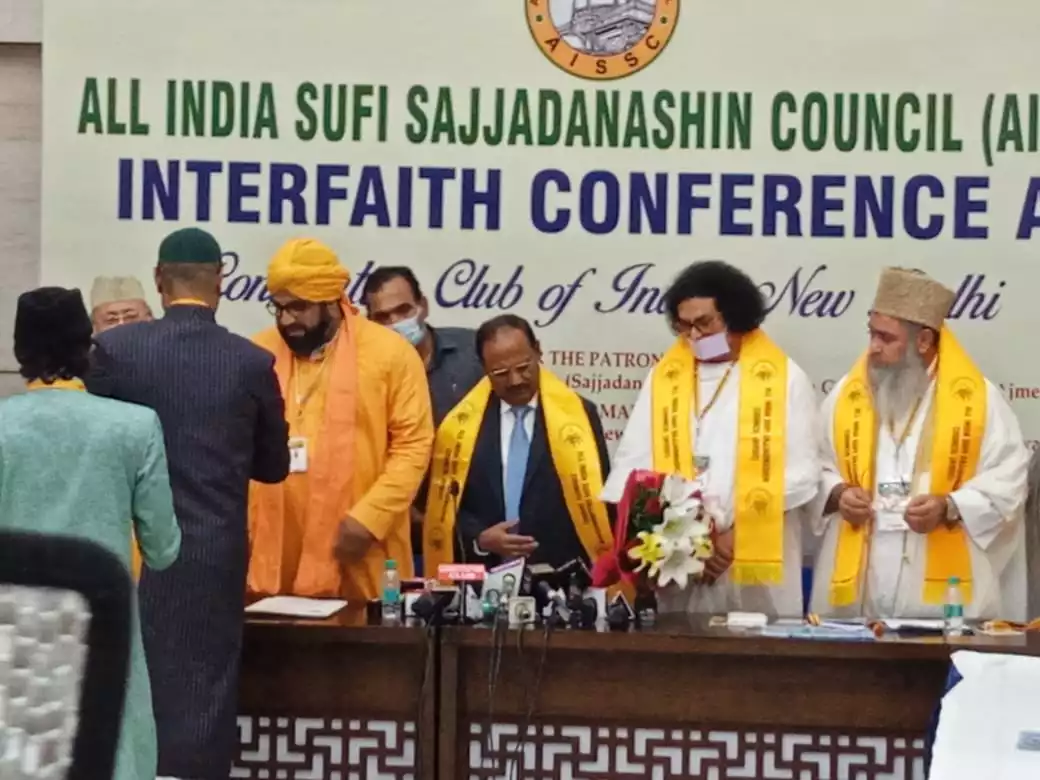

NSA Ajit Doval at a New Delhi inter-faith conference with prominent presence of Sufi religious scholars
In India, it’s always time for Muslims to awaken from dogmatic slumber. However, it’s never been as urgent as it is today. Contrary to perceptions and fear, the community is flourishing, though its progress is subdued in comparison with other social groups. The Muslim mind is filled with “inflated uncertainty” about the future. “What if BJP returns to power in 2024? Will it be onset of doomsday for Muslims? The question is disturbing the Muslim Street to Muslim intelligentsia alike.
But, ask these distraught Muslims whether they know the geography and demography of three North-East states (Tripura, Meghalaya and Nagaland) where BJP has made significant electoral gains, chances are you will not get satisfactory, let alone enlightening, answers. The state of ignorance is not because common Muslims are politically illiterate. It is because they have chosen and have been driven to such a state by their leadership – both political and religious. Very rarely, we see Muslim organisations — and they are aplenty in India – organising programmes for educating Muslim youths in governance, cooperation with government and understanding grassroots politics. Similarly, there is a dearth of programmes for making young Muslims aware of entrepreneurship and other skills of business. The root of Muslim fear stems from such ignorance and misguidance. Nevertheless, a remedy, as a Sufi saying goes, exists where the wound pesters.
No More Victimhood, Please
The most pertinent and persistent theme of discussions among Muslims would be that they are being victimised. “Our businesses are in danger, discriminations against us are rampant, our future is bleak… our Islam is in danger,” and the list will go on. Most often, these discussions are amplified by quoting couplets from famous poet Muhammad Iqbal, popular as Allama, who put forth many agreeable or discordant thoughts to navigate post-British Muslims. A verse from his poem on ancient Arabic poet Abu al ‘Ala al‐Ma‘arri goes like this:
Taqdeer Ke Qazi Ka Ye Fatwa Hai Azal Se
Hai Jurm-e-Zaeefi Ki Saza Marg-e-Mafajat!
(It is the eternal decree of the Judge sitting in Judgement on destinies
— That weakness is a crime punishable by death.)
The import of Iqbal’s couplet is that being weak or just feeling like victims, whether is for a human being or a community, leads to death. It’s an eternal advice to Indian Muslims that they have to stop feeling victims and then seeking redressal of their problems from those who trade their victimhood for various gains. They have to rise above their victimhood. They are the second largest majority of the country. Their voice must reflect this confidence. They must passionately take part in democratic exercises.
Also Read: Doval flags movement to foster communal harmony with Indian roots
(Shujaat Ali Quadri is Chairman of Muslim Students Organisation of India and Community Leader)
Representative Thinlay Chukki of the Tibet Bureau Geneva attended a side event on the situation…
India has achieved a historic milestone by surpassing 1 billion tonnes in coal production, marking…
A federal judge has blocked Donald Trump's administration's move to deport a Georgetown University researcher…
Canadian Prime Minister Mark Carney is likely to ask Governor General Mary Simon to dissolve…
Russian President Vladimir Putin has given another ultimatum to Ukrainians living in the country by…
External Affairs Minister S Jaishankar and Bolivia's Foreign Minister Celinda Sosa Lunda held discussions on…